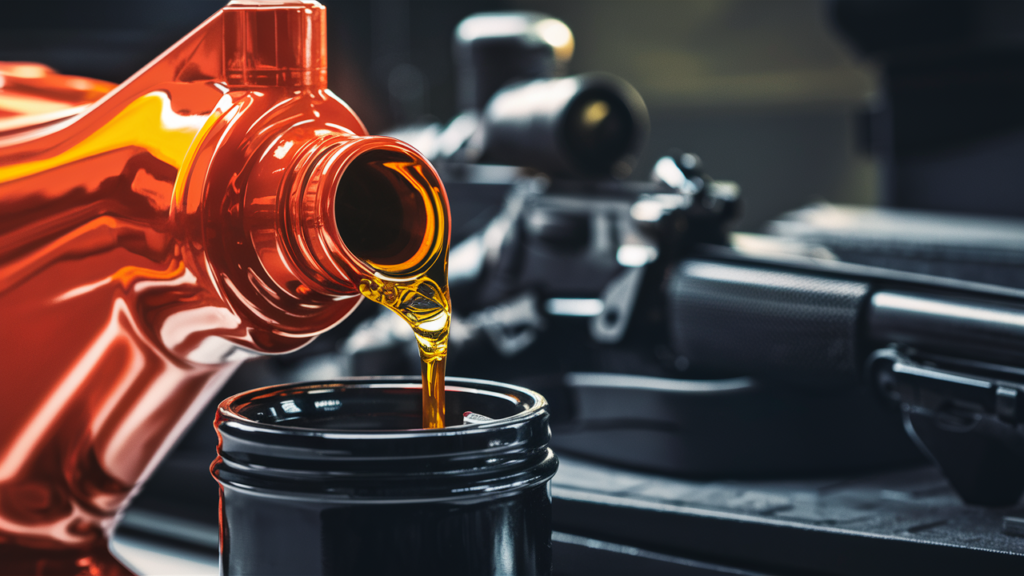Motor oil is designed for engine lubrication, while gun oil is formulated for firearms maintenance. Each type serves a specific purpose and contains different additives.
Choosing the right lubricant is crucial for optimal performance. Motor oil protects engine components by reducing friction and heat, ensuring smooth operation. Gun oil, on the other hand, prevents rust and corrosion while providing lubrication to moving parts. Using the wrong type can lead to serious damage.
Motor oil may leave residues that attract dirt, while gun oil might not withstand high engine temperatures. Understanding these differences helps you select the appropriate product for your needs. Whether maintaining your vehicle or caring for your firearms, using the right oil enhances longevity and performance, making informed choices essential.
Introduction To Lubricants
Lubricants are essential for smooth operation in various machines. They reduce friction, heat, and wear. Different types serve specific purposes. This section explores the differences between motor oil and gun oil.
The Role Of Lubricants
Lubricants perform vital functions in machinery and tools:
- Friction Reduction: They minimize contact between surfaces.
- Heat Dissipation: Lubricants help keep temperatures down.
- Corrosion Prevention: They protect against rust and wear.
- Sealing: Lubricants can seal gaps in machinery.
Different applications require specific lubricant types. Understanding these roles is crucial for optimal performance.
Comparing Motor And Gun Oil
| Feature | Motor Oil | Gun Oil |
|---|---|---|
| Primary Use | Engines in vehicles | Firearms and weapons |
| Viscosity | Varies with temperature | Maintains thickness in all conditions |
| Additives | Detergents and dispersants | Rust inhibitors and cleaners |
| Temperature Range | Wide range based on engine | Effective in extreme conditions |
Motor oil and gun oil serve different functions. Choosing the right one is vital. Each type has unique properties and uses.
Motor Oil Basics
Motor oil is essential for keeping engines running smoothly. It lubricates moving parts, reduces friction, and helps dissipate heat. Knowing its basics can help you choose the right oil for your vehicle.
Composition And Properties
Motor oil consists of base oils and additives. These components work together to enhance performance.
| Component | Description |
|---|---|
| Base Oils | Make up 70-90% of motor oil. Provide lubrication. |
| Additives | Improve performance. Include detergents, anti-wear agents, and viscosity improvers. |
Key properties of motor oil include:
- Viscosity: Measures the thickness of oil.
- Stability: Resists breakdown over time.
- Temperature Range: Performs well in various temperatures.
Common Uses In Vehicles
Motor oil is used in various vehicle types. It keeps engines functioning efficiently.
- Cars: Requires regular oil changes for optimal performance.
- Trucks: Heavier loads need higher viscosity oils.
- Motorcycles: Specialized oils protect engines at high speeds.
- Boats: Marine oils resist water contamination.
Choosing the right motor oil is crucial. Check your vehicle’s manual for specifications. Regular maintenance extends engine life and improves performance.
Gun Oil Essentials
Choosing the right gun oil is vital for maintaining firearms. It protects against corrosion and ensures smooth operation. Understanding its key ingredients and applications enhances firearm care.
Key Ingredients
Gun oils contain specific ingredients tailored for firearms. Here are the most common ones:
- Mineral Oil: Provides lubrication and reduces friction.
- Synthetic Oil: Offers better performance at extreme temperatures.
- Corrosion Inhibitors: Prevent rust and oxidation.
- Solvents: Clean carbon and dirt buildup.
- Friction Modifiers: Enhance the smoothness of moving parts.
Specific Applications For Firearms
Gun oil serves various purposes. Here are its main applications:
| Application | Description |
|---|---|
| Lubrication | Ensures smooth operation of moving parts. |
| Cleaning | Removes dirt, carbon, and fouling. |
| Protection | Prevents rust and corrosion on metal surfaces. |
| Preservation | Maintains firearm condition during storage. |
Using the right gun oil improves your firearm’s performance. Regular maintenance keeps it in top shape.

Viscosity And Performance
Understanding viscosity is key to comparing motor oil and gun oil. Viscosity affects how well these oils perform in different situations. Let’s explore how viscosity impacts lubrication quality.
Understanding Viscosity
Viscosity measures a fluid’s resistance to flow. High viscosity means thick oil. Low viscosity means thin oil. Both types have specific uses.
- Motor Oil: Designed for engines. It must flow easily at low temperatures.
- Gun Oil: Typically thicker. It stays in place for better protection.
The right viscosity helps maintain engine health. It also keeps guns functioning well. Each type of oil has a viscosity rating. This rating guides users in selecting the right product.
Impact On Lubrication Quality
Viscosity directly affects lubrication quality. Proper lubrication reduces wear and tear. Here’s how motor oil and gun oil compare:
| Type of Oil | Viscosity Rating | Best Use |
|---|---|---|
| Motor Oil | 5W-30, 10W-40 | Engines in vehicles |
| Gun Oil | Non-specific, generally thicker | Firearms and machinery |
Choosing the right viscosity improves performance. Motor oil protects against heat. Gun oil prevents rust and corrosion.
Consider these factors:
- Temperature: Motor oil must flow in cold weather.
- Environment: Gun oil should resist dirt and moisture.
- Application: Each oil works best in its specific use.
Understanding viscosity helps make informed choices. Proper oil selection enhances performance and extends lifespan.
Corrosion Protection
Corrosion protection is crucial for both vehicles and firearms. Moisture and environmental factors can lead to rust and degradation. Understanding how motor oil and gun oil protect against corrosion can help you choose the right product.
Motor Oil Capabilities
Motor oil offers several benefits for corrosion protection:
- Film Strength: Motor oil forms a strong film. This film helps keep moisture away.
- Anti-Wear Additives: These additives reduce metal-to-metal contact. They lower the chance of rust forming.
- Heat Resistance: Motor oil withstands high temperatures. This prevents breakdown and maintains protection.
| Feature | Benefit |
|---|---|
| Film Strength | Prevents moisture contact |
| Anti-Wear Additives | Reduces rust potential |
| Heat Resistance | Maintains protection under stress |
Gun Oil Advantages
Gun oil has specific features for protecting firearms:
- Water Displacement: Gun oil repels water effectively. This keeps the surface dry.
- Rust Inhibitors: These additives prevent rust formation. They ensure long-lasting protection.
- Thin Consistency: Gun oil penetrates small parts easily. This coverage helps protect hidden areas.
| Feature | Benefit |
|---|---|
| Water Displacement | Keeps surfaces dry |
| Rust Inhibitors | Prevents rust formation |
| Thin Consistency | Reaches small and hidden parts |
Temperature Tolerance
Understanding temperature tolerance helps in choosing the right oil. Different oils perform uniquely under heat and cold. This section explores the heat resistance of motor oil and the cold performance of gun oil.
Heat Resistance Of Motor Oil
Motor oil is designed to handle high temperatures. It protects engines from wear and tear. Here are some key points:
- Boiling Point: Motor oil can withstand temperatures up to 400°F (204°C).
- Viscosity: It maintains its thickness at high temperatures.
- Breakdown: Quality motor oils resist breakdown under heat.
High-quality synthetic motor oils offer better heat resistance. They perform well in extreme conditions. This ensures engines run smoothly and efficiently.
Cold Performance Of Gun Oil
Gun oil needs to perform well in cold conditions. It ensures smooth operation of firearms. Key factors include:
- Low Temperature: Gun oil can operate in temperatures as low as -40°F (-40°C).
- Fluidity: It remains fluid and does not thicken in cold.
- Corrosion Protection: Gun oil prevents rust even in cold weather.
Choosing the right gun oil ensures reliable performance. Cold weather can affect firearm functionality. Proper oil keeps guns ready in any situation.
Environmental Considerations
Understanding the environmental impact of motor oil and gun oil is crucial. Both types of oil have different effects on our planet. This section explores their biodegradability and toxicity.
Biodegradability Of Oils
Biodegradability refers to how quickly a substance breaks down in nature. Here’s a comparison of motor oil and gun oil:
| Type of Oil | Biodegradability |
|---|---|
| Motor Oil | Low biodegradability. Can take years to break down. |
| Gun Oil | Varies. Some types are more biodegradable than others. |
Motor oil often contains additives. These chemicals can hinder natural breakdown. Gun oil may have biodegradable options. Look for eco-friendly brands.
Toxicity Concerns
Toxicity impacts both human health and wildlife. Here’s a closer look:
- Motor Oil
- Contains harmful chemicals.
- Can contaminate water sources.
- Dangerous to aquatic life.
- Gun Oil
- Some formulations are toxic.
- May cause skin irritation.
- Can harm pets if ingested.
Both oils pose risks. Proper disposal is essential. Always follow local regulations to minimize harm.
Choosing The Right Oil
Choosing the right oil can impact performance and longevity. Motor oil and gun oil serve different purposes. Understanding their characteristics helps make an informed decision. Below are key factors to consider and recommendations for specific uses.
Factors To Consider
- Viscosity: This measures the thickness of the oil.
- Temperature Range: Each oil performs best within specific temperatures.
- Additives: Various additives enhance performance and protection.
- Application: Consider what you are using the oil for.
- Cost: Budget may influence your choice of oil.
Recommendations For Different Uses
| Use Case | Recommended Oil | Reason |
|---|---|---|
| Automobile Engines | Motor Oil | Designed for high temperatures and friction. |
| Guns | Gun Oil | Prevents rust and lubricates moving parts. |
| Heavy Machinery | Motor Oil | Provides excellent protection under heavy loads. |
| Firearms Storage | Gun Oil | Offers long-lasting protection against corrosion. |
Choosing the right oil depends on your specific needs. Always read manufacturer recommendations for optimal results. Make a choice based on the factors discussed.
Frequently Asked Questions
What Is The Difference Between Motor Oil And Gun Oil?
Motor oil is primarily designed for lubricating engines. It reduces friction and prevents wear in automotive applications. Gun oil, on the other hand, is specifically formulated for firearms. It helps prevent rust, corrosion, and ensures smooth operation. Each oil serves a unique purpose based on its application.
Can I Use Motor Oil On My Firearm?
Using motor oil on firearms is not recommended. Motor oil may attract dirt and debris, leading to potential malfunctions. Firearms require oils designed to protect against rust and function smoothly. Opt for specialized gun oils for better performance and longevity of your firearm.
Is Gun Oil Safe For Engines?
Gun oil is not suitable for engines. Its formulation is tailored for metal protection and rust prevention, not for high-temperature engine environments. Using gun oil in an engine could cause damage. Always use motor oil that meets your engine’s specifications for optimal performance.
How Often Should I Oil My Gun?
You should oil your gun regularly, especially after use. A good rule of thumb is to clean and oil your firearm every few months. Frequent handling or exposure to moisture may require more regular maintenance. Keeping your firearm well-lubricated ensures reliable performance and longevity.
Conclusion
Choosing between motor oil and gun oil depends on the intended application. Each serves a unique purpose and offers specific benefits. Understanding their differences is crucial for optimal performance. Always prioritize the right oil for your needs to ensure longevity and efficiency.
Make informed decisions for the best results.








